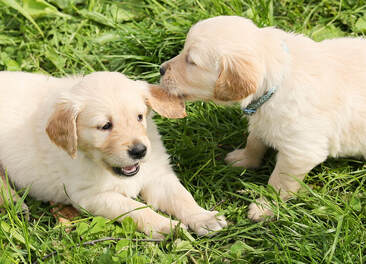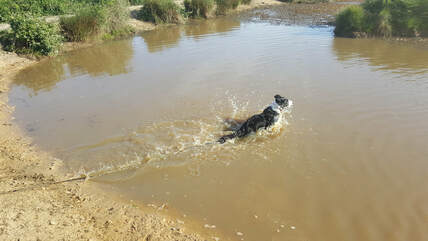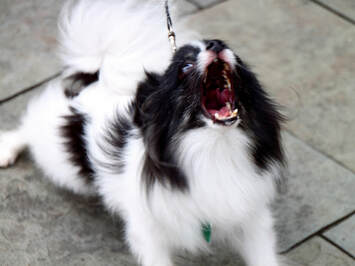|
I think most people now understand how important it is to socialise our puppies. There is lots of information about the critical socialisation period, which finishes somewhere between 14 – 16 weeks of age and therefore we have a very small window of opportunity to get our pups used to the world.
However, this has also caused a rise in ‘puppy parties’. These ‘parties’ tend to be unmanaged and free play is encouraged no matter what sort of interactions are taking place. This is a big concern for me. If you had a shy or timid puppy, then they are very quickly learning that other dogs are actually really scary, and they try to hide or, if that fails, they will learn to defend themselves. If your puppy is a bold, bouncy type, then they are learning to continue this behaviour of being a ‘social bully’ and not listening to other dogs’ body language which is asking them to stop. As an adult dog, we don’t want either of these personality types as we are all aiming to have a well-rounded, confident dog with good social skills. The two parts of socialisation are teaching the social skills for your pup to interact with other living things e.g. people, dogs and other animals, and habituation is about teaching all the things we want them to get used to and usually ignore e.g. noises, traffic, household objects. Hopefully your breeder started your pups socialisation and habituation learning before you even got to take them home, such as gentle handling, introducing to different surfaces, different play items, household noises and sometimes interactions with other suitable adult dogs. All of this habituation and novelty will help build a pup’s confidence and early development. It’s then your turn to continue their education. Puppies are not created equal, even from the same litter. They will need different levels of socialisation and habituation. In the case of puppy socialisation, some will need lots of chances for off lead play with suitable dogs, however another would just learn to be a hooligan if too much free play is allowed. Badly managed interactions can have a negative influence on future behaviour. Being a pet dog is a very hard job as our expectations are so high. We want them to get on with every dog and person they meet, go to every environment and be happy and confident, to cope with being left alone, to not worry with endless ’scary’ noises. Therefore, getting their early upbringing right is a big responsibility. The question I ask myself all the time is “do I want my adult dog behaving like this?” If the answer is no, then think, is this the right thing to be doing with my puppy? Don’t let them practise a behaviour you don’t like! I am not against puppy parties, but they must be managed by skilled professionals. They can be a great resource to get your puppy to learn to interact appropriately with other dogs. I allow off lead play during my puppy classes, however it’s only for a few minutes and I match dogs that are appropriate to interact with each other, and very quickly interrupt any interactions that are not suitable. I am so glad that there is more information available about the importance of puppy socialisation however, as with all knowledge, you need to adapt and grow and continue to question what information is out there. Jo Williams
0 Comments
I’ve had Bria my Border Collie in my life for over a year now and I have to admit I haven’t done much training with her. She doesn’t have a great down unless I use my hand signal. She doesn’t walk perfectly on lead and she doesn’t have many tricks yet. What? Why? As a dog trainer, surely, I must think these things are very important? The answer is yes and no. When Bria first came to live with me, she struggled with the simplest of things such as going through a door way, dealing with stairs or having her collar taken hold of. She certain didn’t understand what a recall was. In her past life I know she lived on a farm, so her version of normal life is very different to what I now needed her to cope with. Living indoors, having different noises around, and living with other dogs are just a few to name. She was 9 months old and had spent 1 month in a rescue centre so in her short life, she had already experienced a lot of changes.
I therefore wanted to take my time to get her settled into my world. I started a plan of what I wanted her to experience and what she needed to learn. I had no expectations of her – other than she is a dog! I think this is a lesson we humans can easily forget; if you haven’t spent time showing your dog how to behave then you cannot be upset if they don’t know and do something ‘wrong’. It’s amazing that a lot of people rescue dogs and some of those now come from abroad, however I do feel that people don’t give them sufficient time to settle into a new life and throw them straight into the deep end. They have all their family round that weekend to meet the new addition of the family. They go out to a busy dog area and expect them to enjoy it. Walk them through town where the sights and sounds for some must be so daunting etc etc. If you have a new member of your family, please give them time to adjust. If you know their background then that can help, but please slow it down. Let them develop a relationship with you first. Play games, learn what they enjoy doing and join in. Then slowly introduce them to their new life whether that’s new places, people or other fury housemates. Bria is now a very settled dog, loves all our visitors, really loves chasing Cuba, has confidence in the home and we have lots of fun together, therefore we are now ready to jump into our ‘training’ journey. This doesn’t mean we haven’t learnt some fab stuff along the way, Scentwork was a great confidence builder for example, but I mean the ‘training’ that I think most expect of a dog trainer’s dog. I will keep you updated with our progress. And for those with new additions to your family, take your time, there is no rush. Give us a call if you would like help on how to build a fantastic relationship. Jo Williams I love working with ‘reactive’ dogs. This is something I have had to work on with my own dogs so understand the emotional roller-coaster it can be. A ‘reactive’ dog requires management and lots of time to start to change their emotional responses to whatever their triggers are, such as other dogs or people. You need to overcome your own embarrassment (from the looks of other dog owners when your dog does bark), feelings of guilt (it must be all my fault) and frustration of not having the dog you dreamed of having (the free running, social dog). It requires planning: taking high value food reward with you on your walks, going to places that you know will have enough space for your dog to keep under their threshold, and perhaps using different equipment like a double ended lead and harness. All this can feel daunting to start with.
The question I get asked a lot is “will it get better”? The short answer is “yes”! You will start to anticipate what your dog needs, read their body language better and in doing so, start to build a better relationship with your dog as they trust that you aren’t going to put them in a situation that they cannot cope with. You will automatically make ‘good’ decisions on behalf of your dog such as increasing their distance from potential triggers. As you both increase in confidence on your walks, your dog’s recovery from an event will also improve and something that may have taken them several days to come down from the ‘high’ of adrenaline and cortisol after a reaction, take a few minutes and they can continue on their walk without any fallout. Will your dog ever become a social butterfly that can free play with all dogs – probably not! You need to have realistic expectation and each dog is an individual. I know many dogs that have become very sociable, however I would not have that expectation at the start. What I can help you with is getting your dog to the point where they are manageable in public, being able to walk down the street without reacting and you both having a more enjoyable life together. Using rewards and managing the environment may be something you always have to do. However, we aren’t trying to change your dog into a robot; life will get easier and you will see improvements. Training will build your dogs confidence (and yours!) so I want to encourage you to start your journey and let’s get training! Jo Williams |
Archives
June 2024
|
|
© COPYRIGHT Paws4teaching 2023
Terms and conditions |






